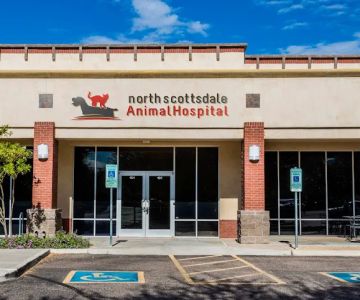What is a Veterinarian?
Veterinarians, or vets, are healthcare professionals responsible for diagnosing, treating, and preventing diseases in animals. Their work is essential for the wellbeing of pets, livestock, and wildlife. The role of a veterinarian can vary greatly depending on their area of expertise. Some vets specialize in treating domestic pets like cats and dogs, while others focus on farm animals, wildlife, or exotic species.

14870 N Northsight Blvd Ste 101, Scottsdale, AZ 85260, USA
See Details1. The Education Path to Becoming a Veterinarian
To become a veterinarian, one must undergo years of rigorous education. This typically starts with completing a bachelor's degree, often in a science-related field such as biology, followed by attending veterinary school. Veterinary school typically lasts four years and includes both classroom learning and hands-on clinical training. After graduation, veterinarians are required to pass a licensing exam to practice professionally. In the U.S., this is usually the North American Veterinary Licensing Examination (NAVLE). Continuing education is also important, as veterinarians must stay updated with the latest medical advancements in animal care.
2. The Types of Veterinarians
Veterinarians can work in a variety of settings and specialties. The most common types include:
- Small Animal Veterinarians - These vets typically treat pets like dogs, cats, and rabbits.
- Large Animal Veterinarians - They specialize in treating livestock like cows, horses, and sheep.
- Exotic Animal Veterinarians - These specialists work with exotic pets like reptiles, birds, and small mammals.
- Wildlife Veterinarians - They focus on the health of wild animals, often working in conservation efforts.
Each type of veterinarian plays a crucial role in maintaining the health of different animal populations, making the profession diverse and integral to animal care worldwide.
3. The Responsibilities of a Veterinarian
Veterinarians are responsible for a wide range of tasks. Their primary duties include diagnosing illnesses and injuries, performing surgeries, administering vaccinations, and providing preventative care. They may also be involved in the research and development of new treatments and medications for animals. Another key part of their job is educating pet owners and farmers on the proper care of animals. For example, a veterinarian may advise dog owners on nutrition, exercise, and the importance of regular check-ups to prevent health issues.
4. The Emotional Side of Being a Veterinarian
The veterinary profession is not just physically demanding; it can also be emotionally taxing. Vets often work with animals who are in pain or distress, and they must provide comfort to the owners of these animals. At times, veterinarians must make difficult decisions about an animal's health, including end-of-life decisions. The emotional aspect of being a veterinarian can be both challenging and rewarding, as it requires empathy and resilience.
5. Job Opportunities in the Veterinary Field
The demand for veterinarians is expected to grow as people continue to value the health and well-being of their pets. According to the U.S. Bureau of Labor Statistics, employment of veterinarians is projected to grow by 16% from 2019 to 2029, much faster than the average for all occupations. This growth is driven by the increasing number of pet owners and the need for veterinary care for both domestic animals and livestock. Veterinarians may work in private practices, research facilities, government agencies, or even non-profit organizations that focus on animal welfare.
6. Why Veterinarians Are Important to Society
Veterinarians play an essential role in society, not only in the care of animals but also in public health. By preventing the spread of zoonotic diseases (diseases that can be transmitted from animals to humans), veterinarians help ensure the health and safety of communities. Additionally, they contribute to the agricultural industry by ensuring the health of livestock, which directly impacts food production. Their work in wildlife conservation also helps protect endangered species and preserve biodiversity.
Conclusion
Veterinarians are vital to both the health of animals and the safety of humans. They undergo extensive training and education to become experts in animal care, and their work is both challenging and rewarding. Whether you are considering a career in veterinary medicine or simply want to learn more about the profession, understanding the role of veterinarians is essential. As pet owners or animal lovers, we rely on them to keep our animals healthy and ensure the overall well-being of our communities.










